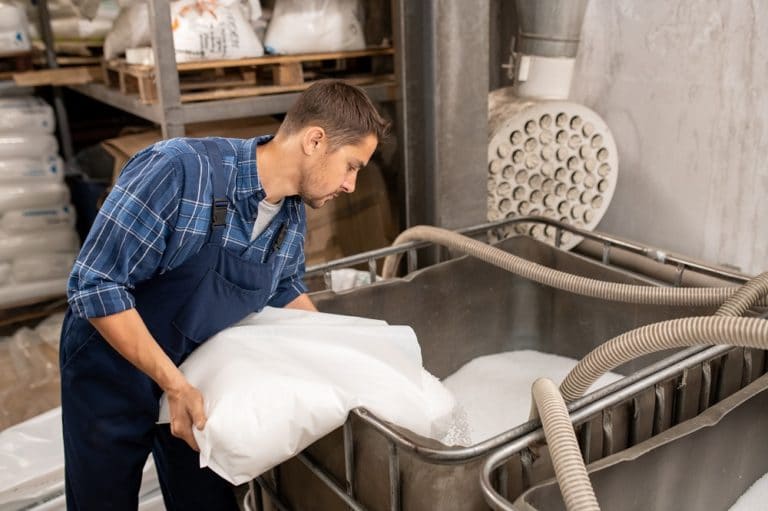When you think of Texas, one of the first products that comes to mind is oil and gas. If you live here, you already know that ‘everything is bigger in Texas’ and that includes our oil and gas sector. And resins! Did you know that in 2019, Texas accounted for 41% of America’s crude oil production? The State of Texas also provided 25%of America’s natural gas production.
There are thirty petroleum refineries in Texas. Just to give you an idea of how much crude oil and natural gas these companies produce, in January of 2019, production topped 5.8 million barrels of crude oil PER DAY. That impressive volume accounted for one-third of America’s oil production that month. And that’s something we can all be proud of.
There is a recipe for each kind of plastic needed, and it all starts from resins and polymers extracted from oil and natural gas. There is a lot of testing, science and research behind every single plastic product or component that is manufactured. In fact, each manufacturer has their ‘secret recipes’ or proprietary blends that are protected and sometimes trademarked.
What Are Resins and How Are They Used in Manufacturing?
Plastic is an important part of the manufacturing and packaging process. From consumer bottles to pipes that are used to transport water, electronics and technology devices, household goods, toys and components for the automotive industry. Everywhere you look, consumer and commercial products rely on plastic and polymers as part of the manufacturing process.
Many people do not know where plastics begin their journey before they are transformed into saleable products. It all starts from resins, an organic material that is derived from crude oil and natural gas.
As you know, Texas is one of the national leaders in oil and gas production. But aside from manufacturing oil and gas for fuel, our Texas oilfields are also a critical part of the resin industry in America.
The best way to think about resins is that every product, part or packaged item you see on a daily basis, is formulated specifically to the needs of the business or consumer. Packaging on food is treated with antifungal properties, to keep free produce from spoiling. Plumbing pipes and fittings (both for residential and consumer use) are designed to resist heat and be resilient to wear and tear from exposure to water or waste.
Another example of the commercial demand for resins, is the pharmaceutical industry. Have you ever wondered why your prescription comes in a tinted orange bottle? That plastic has several strategic additives that protect your medication from UV damage. It also protects your medication with an antibacterial coating, that prevents mold or fungus from growing inside your prescription bottle. The medical supply industry relies on plastics for IV bags, disposable PPE such as gloves and other devices and equipment.
Customized Plastics for Every Product
The process to derive resins from oil and gas is complex. At oil and gas refineries in Texas, the fuels are ‘cracked’ and then converted into hydrocarbon monomers (single molecules) of either ethylene or propylene. The next step is a chemic polymerization that creates large molecule chains of millions of atoms that are bonded together, in a pattern.
Different types of polymers are combined to create resins, that have specific properties depending on how they will be used in manufacturing, and for what products. For instance, some resins are formulated to withstand heat without losing integrity to the shape of the product. This may be used in automotive parts, or household goods (i.e., cooking utensils or containers for storage).
At the next step in the manufacturing process, the formulated resin is molded into shapes. The plastic is then colored, and it may have other additives mixed in depending on the specifications of the product. For instance, many resins must have flame-retardant chemicals mixed in (i.e., plastic food wrap) to prevent the plastic material from igniting under heat.
There are 12 different types of industrial resins:
- Polyester Resin (coatings, flexible plastics, decorative accessories, bottles)
- Phenolic Resin (heat, impact and corrosion resistant, brake linings, cement adhesive)
- Alkyd Resins (electrical insulation, electronic components, paints and putty fillers)
- Polycarbonate Resins (metal replacements, safety gear, film, and lenses)
- Polyamide Resins (non-lubricated bearings, gears, sutures, tires, packaging and bottles)
- Polyurethane Resins (adhesives, foam liners for clothing and insulation)
- Silicone Resins (rubber, laminates, encapsulated resins, water resistant plastics, defoaming)
- Epoxy Resins (laminates, flooring, linings, residential and commercial surface coatings)
- Polyethylene Resins (most common and used for toys, linings, coatings and containers)
- Acrylic Resins (structural panels, adhesives, signs, tiles)
- Polystyrene Resins (cooling towers, rubber, automotive parts, pipes and foams)
- Polypropylene Resins (toys, electronic products, filaments, tubing and coatings)
Other types of plastics have additives that reduce friction (machine parts for instance) or a mix of chemicals that help protect the plastic from being degraded by UV light. One of the best examples of thermo treated processes in resins, is the manufacturing of playground equipment.
Playground equipment you see at the park is made from resins that are UV and heat resistant, to help keep the equipment looking new (and not faded). Playground products are also manufactured to protect the equipment from wearing down due to weather exposure. And in the higher end playground equipment products, the plastic will reflect heat, so that the equipment will not be hot to the touch for safety.
Canal Cartage Provides Drayage Services for the Texas Resin Industry
Since 1983, Canal Cartage has established positive service relationships with many industries across Texas. We provide quality drayage and crossdocking logistics services for the plastics industry. This includes management of chemical and hazmat imports of additives for the production of resin, and exports of resin materials for international shipping.
The top 10 commercial producers of resin in Texas are:
- Dow Chemical
- Lyondell Basell
- Exxon Mobil
- SABIC
- INEOS
- BASF
- ENI
- LG Chem
- Chevron Phillips
- Lanxess
At Canal Cartage, we are proud to be a trusted logistics resource for the Texas commercial resin industry. Contact us today to learn more about our drayage services in Houston. We have decades of experience, and competitive rates for commercial freight.



